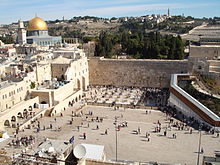Portal:Judaism
The Judaism PortalJudaism (Hebrew: יַהֲדוּת, romanized: Yahăḏūṯ) is an Abrahamic monotheistic ethnic religion that comprises the collective spiritual, cultural, and legal traditions of the Jewish people. Judaism evolved from Yahwism, an ancient Semitic religion of the late Bronze Age to early Iron Age, likely around the 6th/5th century BCE. Along with Samaritanism, to which it is closely related, Judaism is one of the two oldest Abrahamic religions. Religious Jews regard Judaism as their means of observing the Mosaic covenant, which was established between God and the Israelites, their ancestors. Jewish religious doctrine encompasses a wide body of texts, practices, theological positions, and forms of organization. Among Judaism's core texts is the Torah, the first five books of the Hebrew Bible, a collection of ancient Hebrew scriptures. The Tanakh, known in English as the Hebrew Bible, is also referred to as the "Old Testament" in Christianity. In addition to the original written scripture, the supplemental Oral Torah is represented by later texts, such as the Midrash and the Talmud. The Hebrew-language word torah can mean "teaching", "law", or "instruction", although "Torah" can also be used as a general term that refers to any Jewish text that expands or elaborates on the original Five Books of Moses. Representing the core of the Jewish spiritual and religious tradition, the Torah is a term and a set of teachings that are explicitly self-positioned as encompassing at least seventy, and potentially infinite, facets and interpretations. Judaism's texts, traditions, and values strongly influenced later Abrahamic religions, including Christianity and Islam. Hebraism, like Hellenism, played a seminal role in the formation of Western civilization through its impact as a core background element of Early Christianity. (Full article...) Selected ArticleA Kohen (plural: Kohanim) is a direct patrilineal descendant of Aaron, the brother of Moses. In the times of the Temple, Kohanim performed nearly all of the services there, where they were divided into twenty-four family groups, and led by the Kohen Gadol. They also recite the Priestly Blessing to the congregation in synagogues. Kohanim receive twenty-four gifts, only a few of which apply today. They are given precedence in many matters, including the reading of the Torah. Kohanim are also subject to a few prohibitions, including marrying a divorcee and entering a cemetery. (Read more...) Did You Know?Did you know...
Related Categories
Featured Articles
Related PortalsHistory ArticleBethlehem is a Palestinian city located in the West Bank, neighboring Jerusalem, with a population of 25,000 people. The capital of the Bethlehem Governorate of Palestinian Authority, its economy is primarily tourist-driven. Bethlehem, which may be the same as the Biblical Ephrath, is first mentioned in the Tanakh as the place where the matriarch Rachel died, and her tomb stands at the entrance to Bethlehem. The valley to the east is where Ruth gleaned the fields and returned to town with Naomi. It was the home of Jesse, father of King David of Israel, and the site of David's anointment by the prophet Samuel. It was from the well of Bethlehem that they brought him water when he was hiding in the cave of Adullam. Between 132 and 135 the city was reoccupied by the Romans after its capture during the Bar Kokhba revolt. Its Jewish residents were expelled by Hadrian. Bethlehem was sacked by the Samaritans in 529, but rebuilt by the Byzantine emperor Justinian I. It was conquered by the Arab Caliphate of 'Umar ibn al-Khattāb in 637. In 1099, Crusaders captured Bethlehem and replaced its Greek Orthodox clergy with a Latin one. This was expelled after the city was captured by Saladin. With the coming of the Mamluks in 1250, the city's walls were demolished, and were subsequently rebuilt during the rule of the Ottoman Empire. The British wrested control of the city from the Ottomans during World War I and it was to be included in an international zone under the 1947 Partition Plan. The city was annexed by Jordan in 1948, and occupied by Israel in 1967. Since 1995, Bethlehem has been governed by the Palestinian National Authority. (Read more...) Picture of the Week The Siege and Destruction of Jerusalem by the Romans Under the Command of Titus, A.D. 70, Oil on canvas Credit: David Roberts
In the News
Featured Quote
WikiProjectsThings You Can Do
Weekly Torah Portion
TopicsAssociated WikimediaThe following Wikimedia Foundation sister projects provide more on this subject:
Discover Wikipedia using portals | |||||||||



























